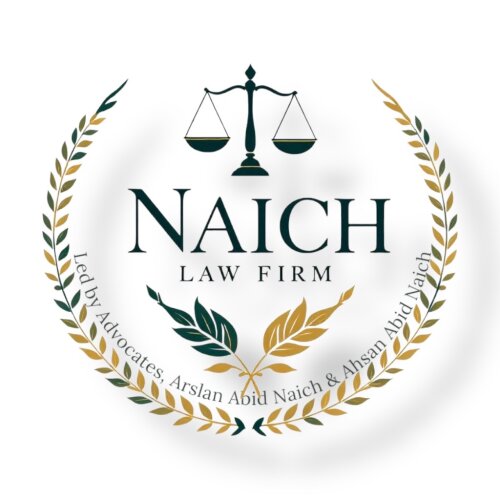Best Construction Accident Lawyers in Pakistan
Share your needs with us, get contacted by law firms.
Free. Takes 2 min.
Or refine your search by selecting a city:
List of the best lawyers in Pakistan
About Construction Accident Law in Pakistan
Construction accidents in Pakistan are incidents that occur on construction sites, leading to injuries, fatalities, or property damage. These incidents can stem from various causes, including falls, equipment failures, and unsafe working conditions. The construction industry is one of the key sectors in Pakistan's economy, but it also involves numerous risks. Laws related to construction accidents are intended to ensure worker safety and provide remedies in case of accidents. Legal frameworks, such as the Factories Act 1934 and the Building Code of Pakistan, play significant roles in regulating safety standards and procedures.
Why You May Need a Lawyer
There are several situations where hiring a lawyer could be crucial in the event of a construction accident:
- Workplace Injury Claims: If you are injured on a construction site, a lawyer can help you navigate the process of claiming compensation for your medical expenses and lost income.
- Employer Negligence: A lawyer can investigate if your employer failed to provide safe working conditions, which contributed to the accident.
- Contractor Disputes: Disagreements with contractors regarding safety procedures and responsibilities often require legal intervention.
- Insurance Claims: Legal assistance may be needed to deal with insurance companies that are reluctant to pay rightful claims.
- Wrongful Death Claims: In cases of fatalities, families may need legal help pursuing wrongful death claims.
Local Laws Overview
In Pakistan, construction accidents are governed by a variety of laws and safety code regulations. Key points include:
- Factories Act 1934: This act provides the framework for worker safety and health regulations on construction sites.
- Building Code of Pakistan: Establishes safety standards for construction to prevent accidents related to building design and construction processes.
- Workmen's Compensation Act 1923: Provides compensation to workers injured during employment due to unsafe conditions or negligence.
- National Environmental Quality Standards (NEQS): Ensures the protection of the environment at construction sites, which indirectly impacts safety.
Frequently Asked Questions
What should I do immediately after a construction accident?
Seek medical attention immediately and report the accident to your supervisor. Document the incident as thoroughly as possible with photos and witness testimonies.
Am I entitled to compensation if I'm injured on a construction site?
Yes, you may be entitled to compensation for medical expenses, lost wages, and other damages. Consulting a lawyer can help you understand and pursue your entitlements.
How do I prove employer negligence in a construction accident case?
Evidence such as safety violations, lack of proper training, failure to provide safety equipment, or ignored safety complaints can be used to prove negligence.
Can I sue a third party for a construction site injury?
If a party other than your employer is responsible for the accident, such as a contractor or equipment manufacturer, you may be able to pursue a claim against them.
What are the common causes of construction accidents in Pakistan?
Common causes include falls from heights, electrocution, equipment failures, inadequate safety measures, and human error.
How long do I have to file a construction accident claim?
The timeframe to file a claim can vary, but generally, it's advisable to act quickly. Consult with a lawyer to ensure you meet any applicable deadlines.
What if my employer doesn't have workers' compensation insurance?
You might still have legal options available, such as filing a lawsuit directly against your employer. Seeking legal advice can clarify your path forward.
Can undocumented workers claim compensation for construction accidents?
Immigration status may impact certain aspects of the claim, but all workers have the right to a safe workplace and may be eligible for compensation.
What role does OSHA play in construction safety in Pakistan?
While Pakistan does not have OSHA, it has its own local regulations and codes that aim to ensure safety on construction sites.
Do construction accident cases go to trial?
Many cases are settled out of court, but some may proceed to trial if an agreement can't be reached. A lawyer can help you assess the best option for your situation.
Additional Resources
For more information or assistance, consider the following resources:
- Pakistan Engineering Council (PEC): Offers guidelines and standards for construction safety.
- Ministry of Labour and Manpower, Pakistan: Provides resources and assistance for labor-related issues.
- Provincial Disaster Management Authorities (PDMAs): Can provide information on emergency responses and safety protocols.
Next Steps
If you need legal assistance due to a construction accident, consider the following steps:
- Consult a Lawyer: Seek the advice of a lawyer with experience in construction accident cases in Pakistan.
- Document Everything: Gather all documentation related to the accident, including medical records, photographs, and witness information.
- File Claims Promptly: Ensure that you are meeting any timelines for filing compensation or insurance claims.
- Know Your Rights: Stay informed about your legal rights and entitlements regarding construction accidents.
- Follow Up: Regularly follow up on your claims and legal proceedings to ensure progress is being made.
Lawzana helps you find the best lawyers and law firms in Pakistan through a curated and pre-screened list of qualified legal professionals. Our platform offers rankings and detailed profiles of attorneys and law firms, allowing you to compare based on practice areas, including Construction Accident, experience, and client feedback.
Each profile includes a description of the firm's areas of practice, client reviews, team members and partners, year of establishment, spoken languages, office locations, contact information, social media presence, and any published articles or resources. Most firms on our platform speak English and are experienced in both local and international legal matters.
Get a quote from top-rated law firms in Pakistan — quickly, securely, and without unnecessary hassle.
Disclaimer:
The information provided on this page is for general informational purposes only and does not constitute legal advice. While we strive to ensure the accuracy and relevance of the content, legal information may change over time, and interpretations of the law can vary. You should always consult with a qualified legal professional for advice specific to your situation.
We disclaim all liability for actions taken or not taken based on the content of this page. If you believe any information is incorrect or outdated, please contact us, and we will review and update it where appropriate.
Browse construction accident law firms by city in Pakistan
Refine your search by selecting a city.
















